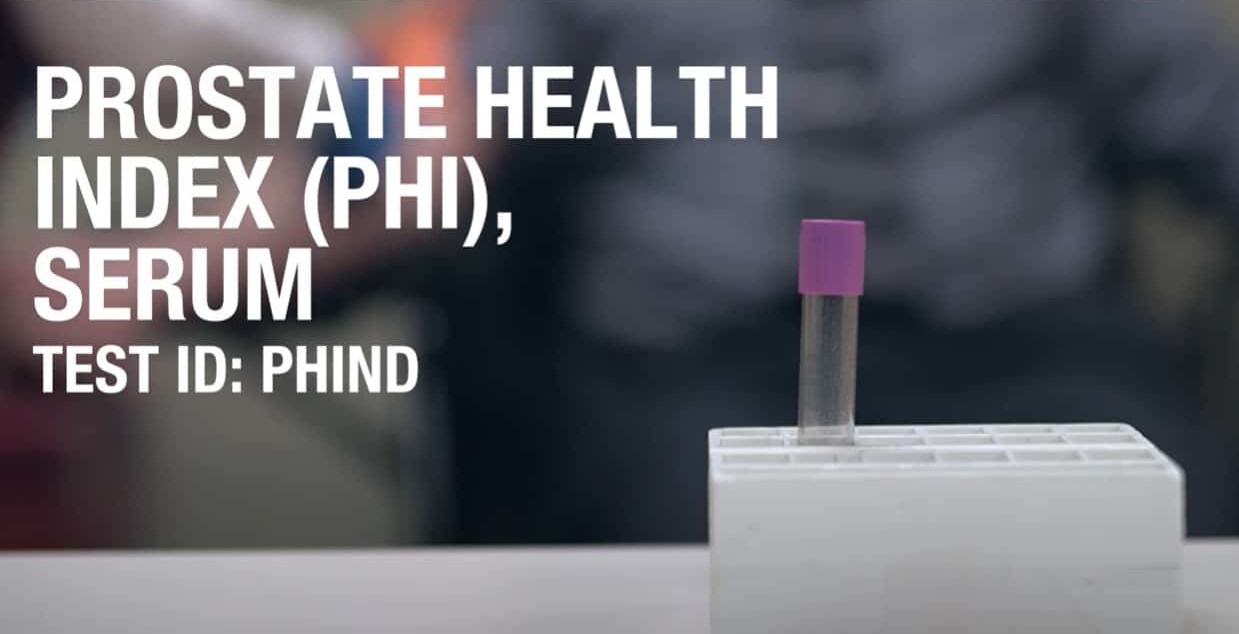What is a prostate health index test?
The Prostate Health Index (phi) test is an n FDA-approved blood test that can help distinguish prostate cancer from benign prostatic conditions.
The Prostate Health Index (phi) test combines three blood tests to produce a “phi score.”
Created for men with a PSA between 4 and 10 ng/ml, the phi test has been confirmed by research to be more valid than the PSA alone in identifying which men need a prostate biopsy. The phi is effective in identifying if an elevated PSA is more likely caused by a benign condition, like infection or normal growth of the prostate that occurs with aging.
PHI Video
Learn more about the Prostate Health Index (phi) test, which provides insights into a patient’s individual risk for prostate cancer and whether or not a biopsy may detect prostate cancer.
Understanding Your PHI Test Results
The Prostate Health Index (phi) can be a highly effective test for men with an PSA between 4 and 10 ng/ml. The phi test is FDA approved and is recommended by the National Comprehensive Cancer Network Guidelines for the early detection of prostate cancer.
View a sample phi test results report and learn more about how to interpret the report. Patient should always discuss the results of their phi test with their healthcare provider first.
Phi FAQs
Below is an initial list of frequently asked questions about the Prostate Health Index (phi).
The PSA test cannot differentiate between prostate cancer and non-cancerous (benign) conditions, such as benign prostatic hyperplasia (BPH). Men who receive a PSA level above 1.5 ng/ML should discuss additional biomarker testing with their healthcare providers prior to considering a prostate biopsy.
Prostate cancer biomarkers (PCMs) are molecules found in blood, tissue, or body fluids. PCMs are revolutionary new, non-invasive diagnostic tests that may help your healthcare provider decide if your prostate cancer is in fact low risk, if something more aggressive may be lurking in your prostate, or if there are hot spots in the prostate that may need to be re-evaluated upon biopsy. PCMs also can help you and your healthcare provider determine the most appropriate treatment for your cancer.
There are many factors that will make one prostate cancer marker test better suited for individual cases. Many times, individuals who have never had a biopsy or had low to intermediate grade prostate cancer (Gleason 3+3=6 or 3+4=7) diagnosed on a biopsy are well suited for blood or urine prostate cancer markers, whereas individuals who have persistently negative biopsies or a biopsy of intermediate to high grade cancer may benefit from tissue prostate cancer markers. Use this interactive questionnaire to see what tests may be right for you. Once you’ve completed the questionnaire, discuss the results with your healthcare provider. Also be sure to check out our Patient Journey section that may help you decide which test is right for you.
Although there are many factors that contribute to your healthcare provider’s decision to conduct a prostate biopsy, there are several urinary and blood based PCMs that may help guide you and your physician through the decision of conducting a prostate biopsy. These include:
Genetic tests also may be worth considering if you have a family history of prostate cancer, breast cancer, ovarian cancer or colorectal cancer. These genetic tests are recommended for men who are determined through genetic counseling to be at potential risk for hereditary cancer:
Good candidates for the FDA-approved blood test, Prostate Health Index (phi), are men with abnormal digital rectal exam (DRE), a PSA between 2-10 ng/ml, a low risk (Gleason 3+3=6) prostate biopsy, or men with a previously negative prostate biopsy.
The phi test measures three things: Total PSA, Free PSA and Pro2PSA. Results are placed into an equation that produces the phi score.
While you should always consult with your physician when reviewing any test results, in general, the Beckman Coulter phi range for probability of prostate cancer risk upon biopsy are:
- phi between 0-26.9: 9.8% risk
- phi between 27-35.9: 16.8% risk
- phi between 36-54.9: 33.3% risk
- phi greater than 55: 50.1% risk
See sample phi test results and learn more about how to interpret the test report.
Learn More
Explore more information about the Prostate Health Index (phi).
- Published articles (2014-2018)
- Beckman Coulter phi website
- Clinical utility of the Prostate Health Index (phi) for biopsy decision management in a large group urology practice setting
- How the Prostate Health Index (phi) Helps Answer: “To Biopsy or Not To Biopsy”
- Prostate Health Index density improves detection of clinically significant prostate cancer


